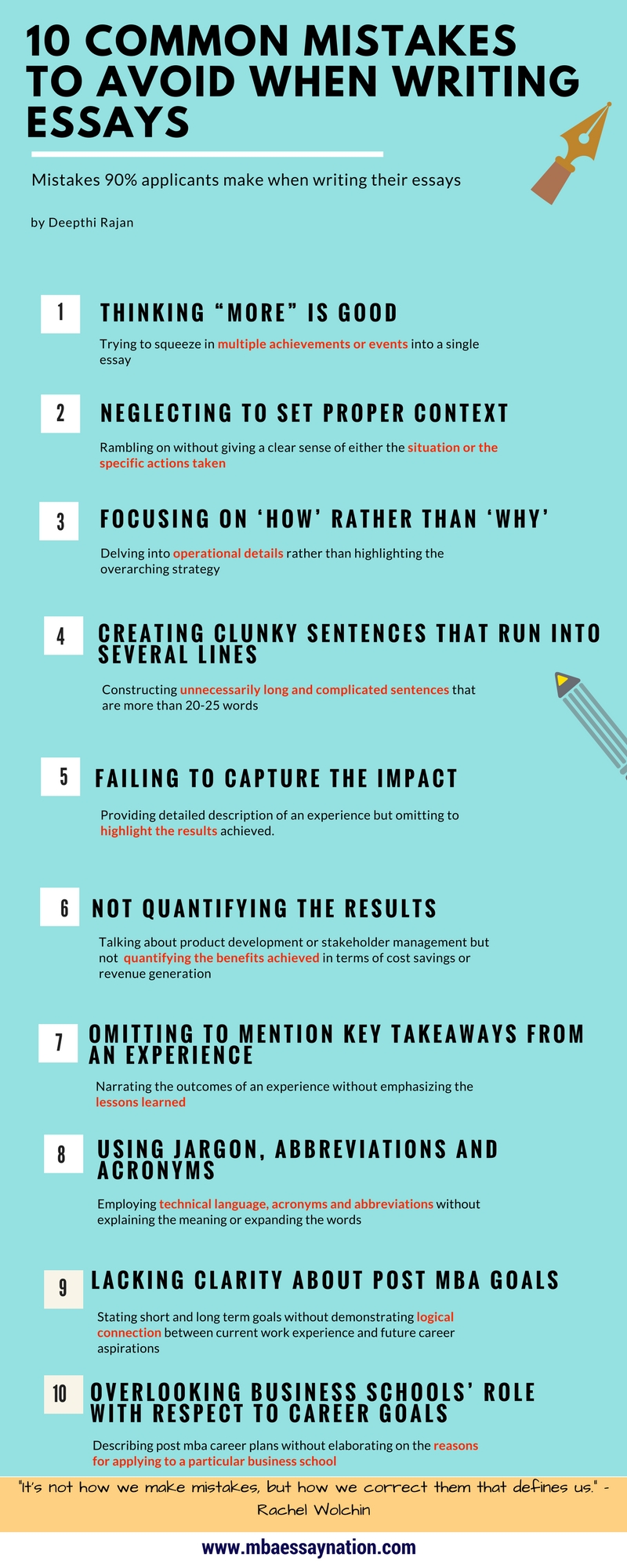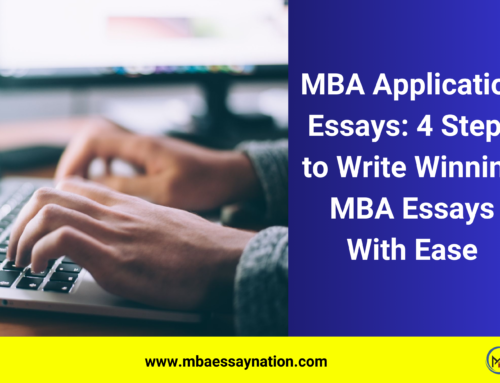10 Common Mistakes 90% Applicants Make When Writing MBA Admissions Essays

Use these MBA essay tips to avoid mistakes 90% of applicants make when writing their MBA Admissions Essays.
By the end of this post, you’ll see how the majority of these mistakes can be avoided or fixed easily just by being more aware of them.
1. THINKING “MORE” IS GOOD
The Mistake
Trying to squeeze in multiple achievements or events into a single essay.
Most MBA admissions essays have a limited word count, so you might be tempted to include multiple achievements or events in a single essay.
But this approach can backfire.
Because it often results in an impersonal narrative that lacks focus and details.
It also limits your ability to highlight the impact and personal growth associated with each of your accomplishments.
The Solution
It’s best to narrow down to at most 2 achievements per MBA application essay – this would allow you to delve deeper into each experience and reflect on the lessons learned while presenting an engaging admissions essay to the AdComs.
2. NEGLECTING TO SET PROPER CONTEXT IN YOUR MBA ADMISSIONS ESSAYS
The Mistake
Rambling on without giving a clear sense of either the situation or the specific actions taken
Most applicants fail to use the MBA essays word count to their advantage because of two reasons –
- They fail to identify the right stories or experiences they should include in their MBA application essays.
- They assume the broader context of their experience would be readily apparent to anyone, even if it’s someone reading it for the first time [cue: the MBA Admission Committees (AdComs)]
This can sound the death knell of your MBA application because, without the necessary clarity, your audience would struggle to make sense of why an achievement or experience is important.
This reduces the impact of your story because it does not highlight the significance of either the situation or the actions you took, or both. In fact, to a first-time reader, your essay might appear disorganized and even unprofessional.
The Solution
Follow these 3 steps to set the context of the experiences you include in your MBA essays –
Firstly, introduce the situation by providing an overview of the situation. Include only key details or factors that influenced it. This will help readers understand the circumstances better.
Next, introduce key players or stakeholders who formed part of the experience. Mention their roles, responsibilities, and relationships to help readers understand the dynamics and their impact on the situation.
Finally, explain the problem or challenge that became the focus of your experience. Describe the specific issue or goal and its implications due to which it required your attention or action.
Doing all these three will help your readers clearly understand not just the context but also appreciate the subsequent actions you took and the outcomes you achieved.
3. FOCUSING ON THE ‘HOW’ RATHER THAN THE ‘WHY’
The Mistake
Delving into operational details rather than highlighting the overarching strategy
One of the things business schools greatly value is a strategic mindset, that is, your ability to step back from the day-to-day details and see the bigger picture, thereby, being more innovative and creative at work.
That’s why a heavy emphasis on the operational details or the nitty-gritty of how you achieved something could backfire because they may not give AdComs the sense of how you might solve complex problems in different situations.
The Solution
Focus on why you did what you did.
For instance, if you created a reporting tool where you learned a new software to deploy it, then rather than talking about the minute details of each step you took, focus on why the reporting tool was important, maybe to your organization or your client’s. Perhaps it speeded up decision-making or helped identify serious inefficiencies.
This way AdComs can also see the larger vision or objectives that guided your thoughts and thereby, actions.
Next, provide concisely summarize your operational activities minus excessive detail. This way you don’t overwhelm your readers with unnecessary specifics and still get to highlight the broader impact of your actions.
Finally, emphasize the key outcomes and the lessons you learned from the experience – when you reflect on an experience, it allows AdComs a chance to view your growth and development.
4. CREATING CLUNKY SENTENCES THAT RUN INTO SEVERAL LINES
The Mistake
Writing unnecessarily long and complicated sentences.
The problem with long sentences is well understood by most of us.
Don’t you hate it when you come across complex, convoluted lines that seem to go on forever?
Yet, when it comes to MBA essays, most applicants tend to overwhelm their readers with this very mistake.
Not only do long and clunky sentences impact comprehension, they also affect how well your readers will engage with your essays.
The Solution
Focus on clarity and simplicity.
Write shorter sentences, preferably no more than 20-25 words.
Make sure your every sentence conveys just one idea or thought.
Use straightforward language.
Review your essay drafts to weed out redundant words, phrases, or anything that isn’t essential to your narrative.
5. FAILING TO CAPTURE THE IMPACT IN YOUR MBA ADMISSIONS ESSAYS
The Mistake
Providing a detailed description of an experience but omitting to highlight the results achieved.
This is an extension of mistake #3 but is relatively easier to fix.
The Solution
After you have detailed an experience – the situation, key players involved, and the actions you took – make sure you capture the results or outcomes you achieved.
When you emphasize the results, you showcase your abilities and skills in solving problems that matter, thereby differentiating yourself from those who might have similar experiences.
6. NOT QUANTIFYING THE RESULTS IN YOUR MBA ESSAYS
The Mistake
Talking about results achieved without quantifying them.
Though this may seem like an intuitive thing to do — specify the magnitude of what you have achieved, in practice — most applicants fail to quantify the outcomes they achieved.
Without quantification, your results run the risk of appearing vague, reducing the value of your achievements.
It’s also difficult to assess the relative success or effectiveness of your achievements.
The Solution
Use specific figures, percentages, or measurable indicators to quantify the results achieved, as much as possible.
7. OMITTING TO MENTION KEY TAKEAWAYS FROM AN EXPERIENCE
The Mistake
Narrating the outcomes of an experience without emphasizing the lessons learned
Yet another mistake that seems intuitive and even straightforward on the surface, but is challenging for most because it requires, rather demands, careful reflection.
The Solution
Carve out time to reflect on an experience and how it made you better than before.
Identify your significant takeaways from the experience – it could be skills, mindset shifts, and more.
Include those key insights in your essay. That’s it!
8. USING JARGON, ABBREVIATIONS, AND ACRONYMS IN YOUR MBA APPLICATION ESSAYS
The Mistake
Employing technical language, acronyms, and abbreviations without explaining the meaning or expanding the words.
This mistake can be attributed to a cognitive bias most of us fall prey to – “The Curse of Knowledge”.
Because you understand your domain or industry so well, you assume everyone else does too.
But what happens is you make your narratives inaccessible to your readers, who may not be from your industry or function.
What follows next is you lose your audience because they don’t want to expend precious mental energies to understand your world.
So how do you make it easy for your readers to quickly grasp your essays?
The Solution
Clarify any technical terms you mention in your MBA application essays.
Expand the acronyms and abbreviations you use and provide their meaning.
Lastly, always keep your audience in mind and think about how you can simplify your narrative for those who don’t have specialized knowledge of your field.
This way you demonstrate greater empathy for those reading your MBA essays.
9. LACKING CLARITY ABOUT POST-MBA GOALS IN YOUR MBA ESSAYS
The Mistake
Stating short and long-term goals without demonstrating a logical connection between current work experience and future career aspirations.
One of the major reasons for making this mistake is not doing enough research into why you need an MBA.
Most applicants assume an MBA will help them land bigger roles, better salaries, or make it easier to switch industries or functions.
But in reality, to achieve any of these, an MBA degree alone won’t suffice.
In other words, knowing where you want to go is not enough.
You also need to know the why and how you will get there.
That’s why AdComs want to see post-MBA goals that have been well-thought-through and make immediate sense when they read your MBA admissions essays.
The Solution
Start by reflecting on your professional strengths and weaknesses.
Next, think about what new strengths you want to gain and areas you want to develop further.
Then think about the opportunities and threats (such as skill gaps) you are likely to experience if you were to continue in your current role.
Finally, research and identify roles you want to take up that’ll give you the opportunities to build the skills and expertise you want.
At each step, check if there’s a connection between what you have done and what you aspire to do after an MBA.
Also, determine how an MBA can help you with the transition.
You may, in avoiding this mistake, also realize that an MBA may not even be the right path for you!
10. OVERLOOKING BUSINESS SCHOOLS’ ROLE WITH RESPECT TO CAREER GOALS
The Mistake
Describing post-MBA career plans without elaborating on the reasons for applying to a particular business school.
Most applicants typically want to apply to MBA programs or business schools that are either ranking highly or have been recommended by someone in their networks.
But just like individuals, business schools and MBA programs are also unique, with their own strengths and weaknesses.
If you don’t take the time to research and understand if your target MBA program is a good fit for you and your post-MBA goals, you risk submitting an impersonalized application. Worse, your essays will not reflect any alignment with what your target business schools have to offer to help you achieve your goals.
The Solution
Research thoroughly the MBA programs you want to apply to.
Understand the resources a business school has to offer – courses, faculty, student clubs, alumni support, and more.
Delve deeper into how those resources will help you build the skills, knowledge, and experiences you require to transition smoothly into your post-MBA career plans.
The key is to be genuinely interested in a school – be passionate about your target business school and what it can offer you.
Weave those elements into your MBA application essays to create a highly personalized narrative aligned with your post-MBA goals and the school’s offerings.







![CMU Tepper MBA Essays for 2022-2023 – Essay Questions, Tips, and Deadlines [With Sample Essays Inside]](https://mbaessaynation.com/wp-content/uploads/2022/09/MBAEssayNation-Blog-Post-Header-Image-4-500x383.png)
[…] Also, check out our infographics on Top 10 mistakes to avoid when writing your ISB essays. […]